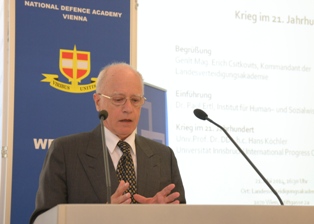I.P.O. Information Service
"War in the 21st Century"
I.P.O. President speaks at National Defense Academy of Austria

Vienna,
22 May 2014
RE/24955c-is
![]()
Professor Hans Köchler, President of the International Progress Organization, yesterday delivered a keynote speech on "War in the 21st Century." The event at the National Defense Academy of Austria in Vienna was part of an interdisciplinary lecture series, jointly organized by the Institute for Dialogue and the Institute for Religion and Peace of the Catholic Military Diocese, in commemoration of the beginning of the First World War. The Commandant of the National Defense Academy, Lieutenant General Erich Csitkovits, and the Deputy Commandant, Brigadier-General René Segur-Cabanac, attended the event.
After an introduction by General Csitkovits, Professor Köchler gave an overview of the development of the laws of war in the last century and highlighted the abrogation of the jus ad bellum, namely the banning of the international use of force, and the establishment of a system of international criminal justice as major paradigm changes affecting the theory of war. He further analyzed systemic contradictions in the corpus of modern international law that have prevented the universal application of the ban on the threat or use of force. He referred to the privileged position of the five permanent members of the United Nations Security Council and to the Council's statutory influence, whether direct or indirect, over the exercise of jurisdiction by the International Criminal Court, in particular as regards future jurisdiction on the crime of aggression. Professor Köchler also gave a critical evaluation of the doctrine and practice of "humanitarian intervention" since the end of the Cold War, and that doctrine's evolution towards what, at the beginning of the 21st Century, the United Nations Security Council defined as the principle of "responsibility to protect" (R2P).
He also dealt with structural, ethical and ideological aspects of warfare. Describing the "new face of war" in the 21st century and highlighting specific moral dilemmas, Köchler spoke, inter alia, about the notion of a global war on terror and the evolving doctrine of cyber war. He emphasized that the concept of asymmetric warfare should not only be applied to the disparity between regular armies and the tactics of guerrilla fighters, but also to the ever widening gap between high-tech armies and their less advanced counterparts, which has rendered the idea of "fairness" in battle virtually meaningless. Referring to drone warfare, he dealt with the myth of "precision strikes" and explained that the practice of "targeted killings" is incompatible with fundamental principles of human rights and the rule of law. He further analyzed the notion in the context of the doctrine of preventive war, referring in particular to the concept of "anticipatory self-defense."
In his final remarks, Prof. Köchler warned that the ever more abstract nature of violence - in a high-tech environment where the soldier is increasingly detached from the consequences of his actions - may effectively lower the threshold for the use of lethal force and lead to a further brutalization of warfare. He emphasized the special moral responsibility of world religions and the interfaith community, and said that, in the era of nuclear arms and high-tech warfare, the development of the human conscience must not lag behind the development of arms technology.
The discussion following the lecture was moderated by the Director of the Institute for Religion and Peace, Episcopal Vicar Dr. Werner Freistetter of the Catholic Military Diocese of Austria.
***
News release / summary in German
![]()
Publications of the International Progress Organization
-
The Concept of Humanitarian Intervention in the Context of Modern Power Politics: Is the Revival of the Doctrine of "Just War" Compatible with the International Rule of Law?

-
The Use of Force in International Relations: Challenges to Collective Security

-
The Security Council as Administrator of Justice? Reflections on the Antagonistic Relationship between Power and Law

International Progress Organization
Enquiries:
info@i-p-o.org,
phone +43-1-5332877, fax +43-1-5332962, postal address: A-1010 Vienna,
Kohlmarkt 4, Austria